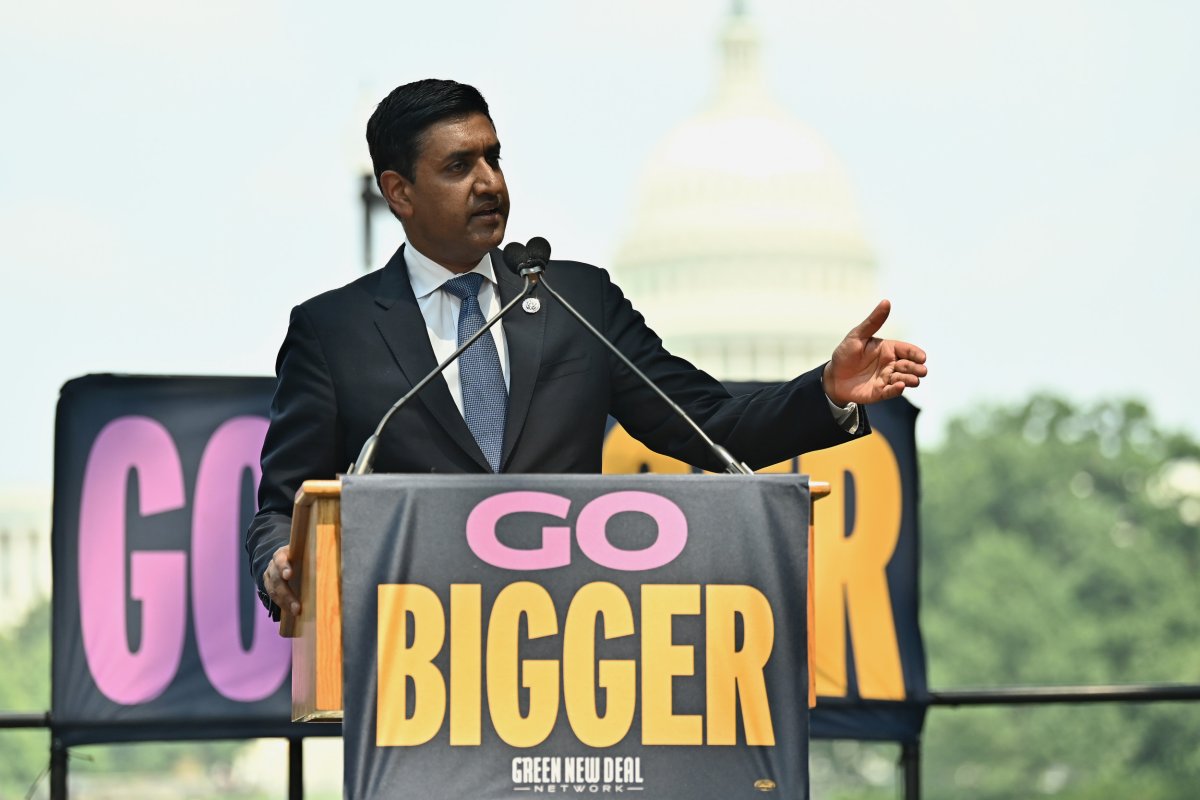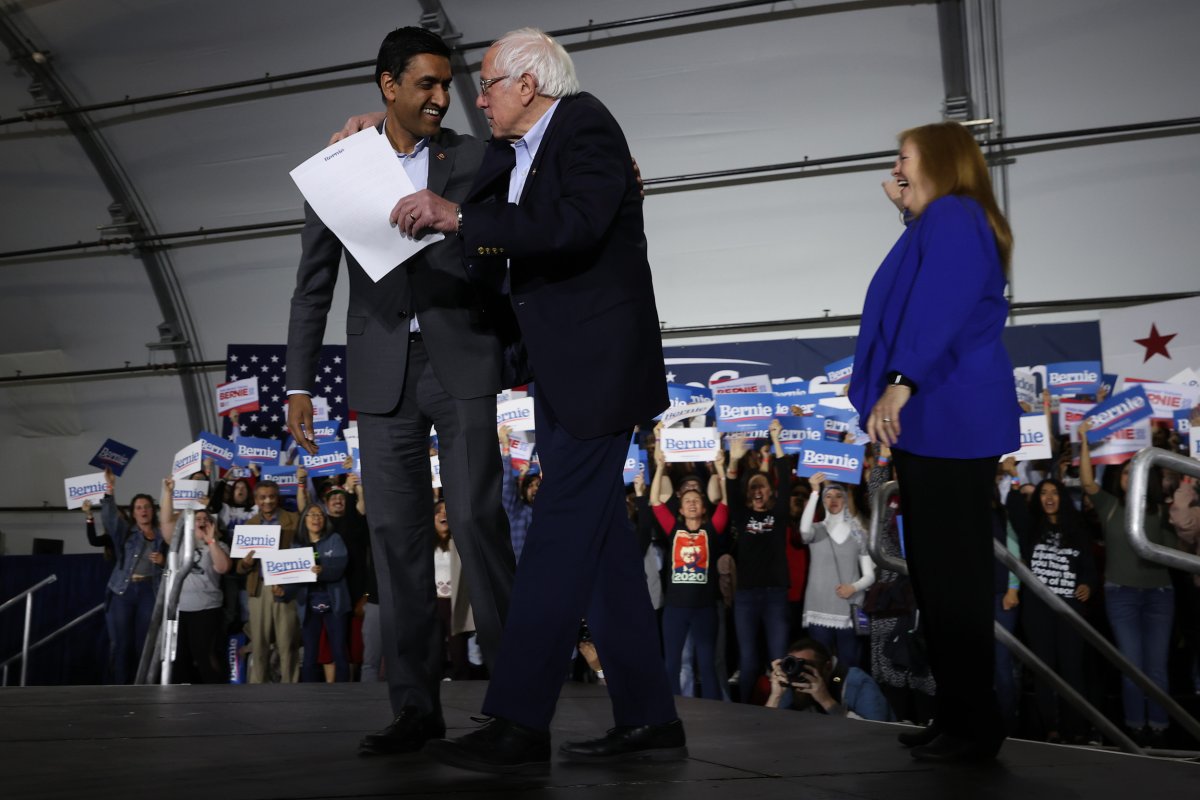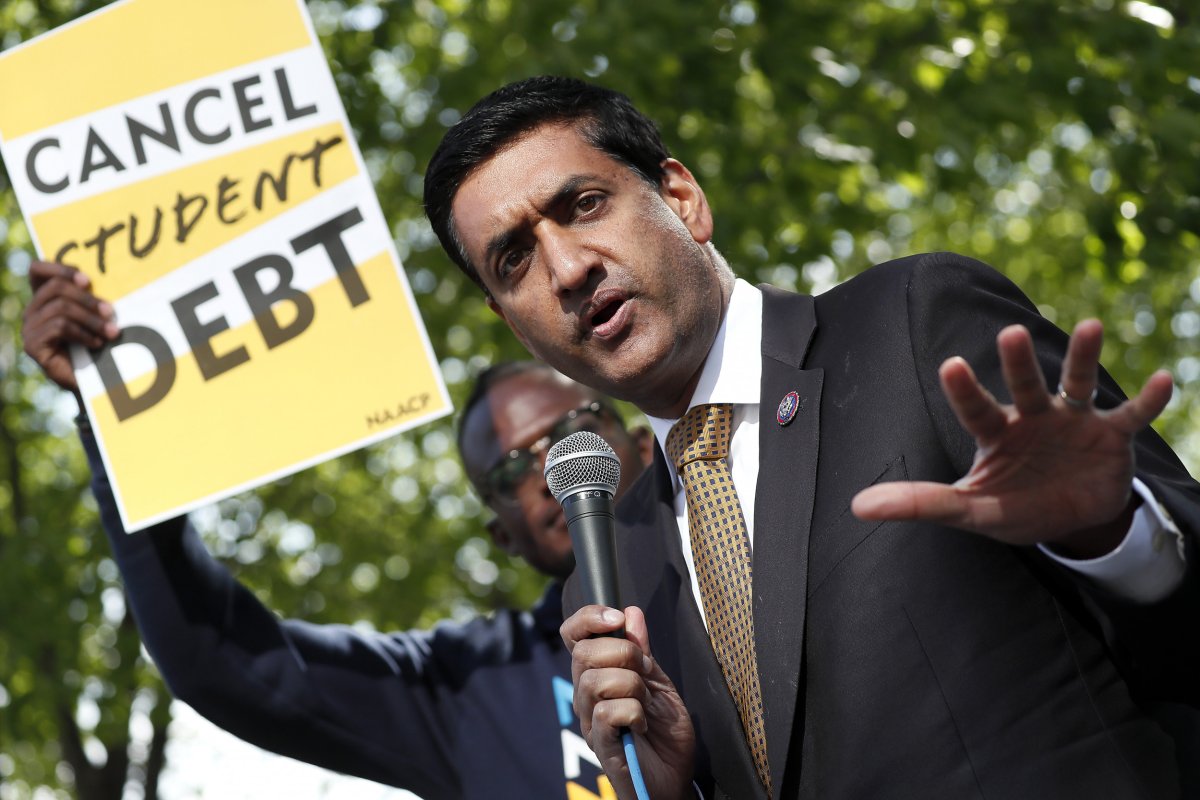Representative Ro Khanna, a California Democrat, believes his party needs to focus more on being a "party in motion," with a "hopeful" and "aspirational" vision for the country if it wants to maintain control of Congress and the presidency moving forward.
As deputy whip of the Congressional Progressive Caucus and a former co-chair of Senator Bernie Sanders' 2020 presidential campaign, Khanna sits firmly on the left flank of the Democratic Party.
At the same time, unlike some other progressives, Khanna readily stresses the need to compromise to get things done for the American people. He's also a proponent of doing interviews with Fox News and other right-wing media outlets, which some within his party have publicly boycotted.
Although analysts and polls present dismal prospects for Democrats going into the midterms later this year, Khanna believes his party still has time to turn things around. He thinks that instead of focusing on negatives, Democrats should begin stressing that the U.S. is the "greatest country in the world," highlighting its diversity and strengths, while recognizing that there are flaws that still need to be addressed.

Born to Indian immigrants in Pennsylvania, Khanna often highlights his experience as a first-generation American as an example of the uniqueness of the U.S. in global history. He points out that the country is doing something historic by working to create a multi-racial democracy, using his own story as an example of how the nation has progressed.
"We should be proud of what makes us exceptional," Khanna told Newsweek.
With the nation facing heightened polarization, including within the Democratic Party, between progressives and moderates, Khanna believes his party actually has "consensus on so many issues."
Despite the dire predictions, Khanna thinks he and his colleagues can turn things around before the midterms. He also speaks highly of President Joe Biden, regardless of his previous effort to elect Sanders instead of the more moderate Democrat.
Khanna spoke with Newsweek by phone on Wednesday to discuss the midterms, tensions between progressives and moderates and the hopeful vision he wants his party to stress more moving forward. The interview has been lightly edited for brevity and clarity.
The midterms are on everyone's minds and the predictions for Democrats are not good. What's your assessment? And what's your response to those who have all but written off the possibility that Democrats could remain in control of the House?
We still have time to make a big impact. We have to be clear what we're going to do for people in the next two years and why we're going to be better at reducing prices, tackle inflation. If the Republicans get into power, they're going to have an agenda of kicking people [Democratic lawmakers] off their [House] committees and impeaching Biden. Our agenda will be figuring out how we increase production in this country. We're doing that with passing the COMPETES Act, bringing semiconductors back. We can start bringing other production back to America, and that will help lower prices.
We're for providing relief to working families. Having a tax on big oil, on the windfall profits, and then sending a check to the American public, so that they have some relief with gas prices. We're for forgiving student loans. I've been calling on the president to do that before the midterms and we will keep fighting to forgive more of that. We are for making sure that we have child care for families in this country. We have to emphasize what we would do [if we're] given the next two years, and what the Republican agenda is, and make it a choice election.
Inflation is a real concern for voters. A lot of voters, rightly or wrongly, believe Democrats' policies are largely to blame. How do you counter or respond to that narrative?
With facts. First of all, a lot of the spending took place under [former President Donald] Trump. Three trillion dollars of it was under Trump. And I supported that spending. It was to get us out of a big economic downturn caused by a global pandemic. And the real cause of inflation is that there have been supply chain shocks because of the pandemic, and the demand returned with great intensity after the pandemic.
These are not phenomena caused by any politician. I mean, it would be just as silly if I blamed Trump for the inflation as it would be to blame Biden spending for the inflation.
If you could make a concise message that the party could embrace, what do you think that would be?
We're going to make America produce again. The reason prices are up here is because we were too dependent on overseas products and goods. We're going to build America's industry again.
One of the big stories within the Democratic Party over the past few election cycles has been this tension between progressives and moderates. You're a progressive, part of the Progressive Caucus. Do you feel that progressives are winning that debate within the party?
We're winning on the policy dimension. Many Democrats now have embraced key progressive priorities. And we have more and more members joining the Congressional Progressive Caucus every day. I think they certainly want to be affiliated with us.
Some moderate Democrats and those on the right contend that progressives are hurting Democrats' chances in elections. Conservatives say Biden ran as a moderate and then became "far left" as president, arguing that voters are responding negatively to that. What's your response to that assessment?
You can't have it both ways. You can't blame progressives if we're in leadership and then blame us if we're not in leadership. The reality is that a progressive didn't win the presidency. It was Joe Biden who won. A progressive wasn't elected as vice president.
Had the president and vice president been [former 2020 Democratic presidential candidates Senators] Bernie Sanders and Elizabeth Warren and there were criticisms—that's fine. You could blame the progressives. But that's not who won. It was the centrist wing of the party that has won. They're the ones calling the shots.

When it comes to legislating, there has been this divide between progressives and moderates on some of Biden's key priorities. Do you see that tension between those two factions growing further apart or still aligning more often than not?
I think there's consensus on so many issues. Remember, we passed the American Rescue Plan. We passed infrastructure [the Infrastructure Investment and Jobs Act]. We passed the Build Back Better [Act] through the House, moderates and progressives. We're going to get passed the COMPETES Acts. There's large consensus on things like the legalization of marijuana, on capping the cost of prescription drugs, on universal child care. I think there is a fair amount of consensus.
In a recent interview with Politico, you stressed the need to compromise and talked about your relationship with Senator Joe Manchin. Do you still feel optimistic that there is a compromise possible with BBB or at least some of its key components?
I am hopeful—that we have to do something on climate. And I'm hopeful, given this moment where we see the consequences of being dependent on Russian oil, the globe being dependent on it, that there's a move—a moon shot—for renewable energy, and that we can do something on climate. We may have to compromise on some of the oil, short-term oil production, natural gas production. But I think if we could get a robust climate bill, there is a possible path.
Are you more concerned about getting moderates like Manchin on board, or that fellow progressives could derail negotiations?
I'm more concerned with how we get it through the Senate. I think we get progressives on board as long as there's a robust climate provision.
There has been so much focus on getting all 50 members of the Democratic caucus in the Senate on board with a BBB bill. Do you not think there is any possibility of doing a bipartisan compromise on parts of this legislation? For instance, Senator Mitt Romney, a Utah Republican, has put forward a Child Tax Credit proposal.
I'm open to putting things on the floor one-by-one. I'm open to it. Let's put universal pre-school, let's put child care, let's put expansion of Medicare, let's put the free community college, let's put all of that for votes on the House and Senate [floors]. I'm not confident it will get the 60 votes in the Senate, but there's no harm in trying.
We're going to make America produce again. The reason prices are up here is because we were too dependent on overseas products and goods. We're going to build America's industry again.
Have you had discussions with Republican colleagues about doing something like that? Or has it not really been a focus?
We've discussed it in terms of the leadership, putting those votes on the [floor in the] House. On the Senate side, it's all about can you get to 60 votes? That would be a question there, if they can get that. A lot of times you have two or three Republicans. But I'm fine, let's force the vote on these things, see where people end up.
You and others within the Democratic Party may be willing to compromise. But it seems there is this growing frustration among the progressive base—particularly young progressives—with the willingness of progressive Democrats to compromise. What's your response to progressives who have begun to see any compromise on key issues as basically a betrayal?
I understand their frustration. There hasn't been student debt relief. They were promised that. We haven't had climate legislation. They were promised that. We haven't had a $15 minimum wage. They were promised that. We haven't had any expansion on Medicare. They were promised that. We haven't had strengthening of unions. They were promised that. That's their sense of frustration.
What I say is, I'm fighting for all those goals. We're trying to get something more than nothing. And let's elect more progressives to the House and the Senate to make it easier in the future.
You suggested on CNBC that it would make sense for Twitter to allow Trump back on the platform if he were the GOP nominee in 2024. I think that view is somewhat controversial with many Democrats. What's your response to those who think Trump should, and others like him should, be silenced to the greatest extent possible?
I thought the suspension was totally justified based on his incitement of violence. But I think if he becomes the nominee and starts representing millions of people, it becomes hard—all those voters being denied a voice. I would have strict guardrails saying, "If you engage in incitement of violence again, you'd be suspended." But [we should be] allowing him at least the opportunity, or any nominee, to express their views on the issues, if you're representing a major party.
Are you concerned with this viewpoint from some on the left, and also some on the right, to basically silence opposition?
I am. I think you have to create a wide space of public discourse. The right wants to silence Toni Morrison. The right wants to silence people they disagree with. My view is that we want to have a strong First Amendment tradition—a strong tradition of engaging with all types of ideas.
In a similar vein, you've been willing to go on Fox News and other conservative outlets. In the last presidential election, Senator Elizabeth Warren and some other Democrats announced they'd boycott Fox. Why do you disagree with that approach?
We have to meet voters where they're at. There are a lot of voters—Republicans and, by the way, some Democrats—who watch Fox. It's better to get to make the case to them, to try to persuade them, and to understand where they're coming from than to totally ignore them.

I think many Americans, whether rightly or wrongly, currently view Democrats as always being negative—pointing out the flaws in the country, the racism, etc. You often speak very positively about the country and how you see the country developing as a multi-racial democracy...
It's the greatest country in the world. It's an objective fact. Why do millions of people want to come here? What other country in the world is there that millions of people want to immigrate to? They don't want to go to China. There's no stampede to go there. They certainly don't want to go to [President Vladimir] Putin's Russia. They're not all dying to go to France. Maybe for vacation, but they don't think that's the road to building wealth, to go to France. They're coming here. That's the reality. We're the greatest nation.
Do we have our flaws and challenges? Absolutely. Do we need to work together to fix them and make sure we remain preeminent in the 21st century? Yes. But we should be proud of what makes us exceptional. In fact, if you want to make that the first question, I think the Democratic Party should start their speeches with this paragraph that I just recited.
Why don't you think that message is more pronounced on your side of the aisle?
People are understandably upset about a lot of things. It's a generation that has grown up with debt, student debt. [A generation] which has had a hard time finding housing, which often doesn't have basic health care, is more aware of historical injustices. I love the passion and activism of young people to fix some of the historical wrongs. But that has to be done in a framework of understanding what's good and right about America as well.
I would argue our greatest leaders, people like Frederick Douglass, Abraham Lincoln, Martin Luther King [Jr.], all adopted an aspirational framework. Not a Pollyanna-ish one. They were willing to call out the injustices and wrongs very clearly. But they were hopeful for the country's future.
There is talk now about the next generation of House Democratic leadership. Do you personally have leadership ambitions?
I do not, no.
Some are already speculating about 2024. There's talk of a primary challenger to Biden or others who say that the president just won't be up to the challenge of a second campaign. Do you think Biden is up to the challenge? Would you potentially support another Democrat in 2024?
I do think he's up to the challenge. I think he has won against Trump. He's ahead in these important states, Georgia, Pennsylvania and Arizona. He's the best bet to make sure we do it again. I would support him.
Is there anything else that you'd like to share with our readers about what Democrats' strategy should be going forward or how you assess the current situation within the party?
I think we have to be a party in motion, that is working on trying different things to improve the lives of the middle class, the working class—a party that is doing things. What are we doing on inflation? On increasing our production? On forgiving student loans? I think that if we can convey that sense that we are working our hardest, with intensity, to improve people's lives and that we have a hopeful vision of the country, an aspirational vision of the country, then I think we will do well.
Uncommon Knowledge
Newsweek is committed to challenging conventional wisdom and finding connections in the search for common ground.
Newsweek is committed to challenging conventional wisdom and finding connections in the search for common ground.
About the writer
Jason Lemon is a Weekend Editor at Newsweek based in Brooklyn, New York. Prior to taking on the editor role, Jason's reporting focused on ... Read more
To read how Newsweek uses AI as a newsroom tool, Click here.








